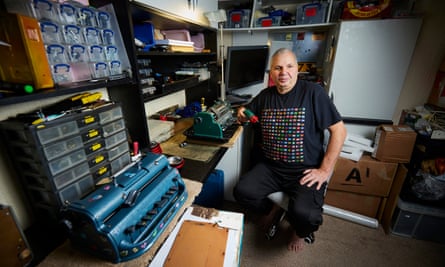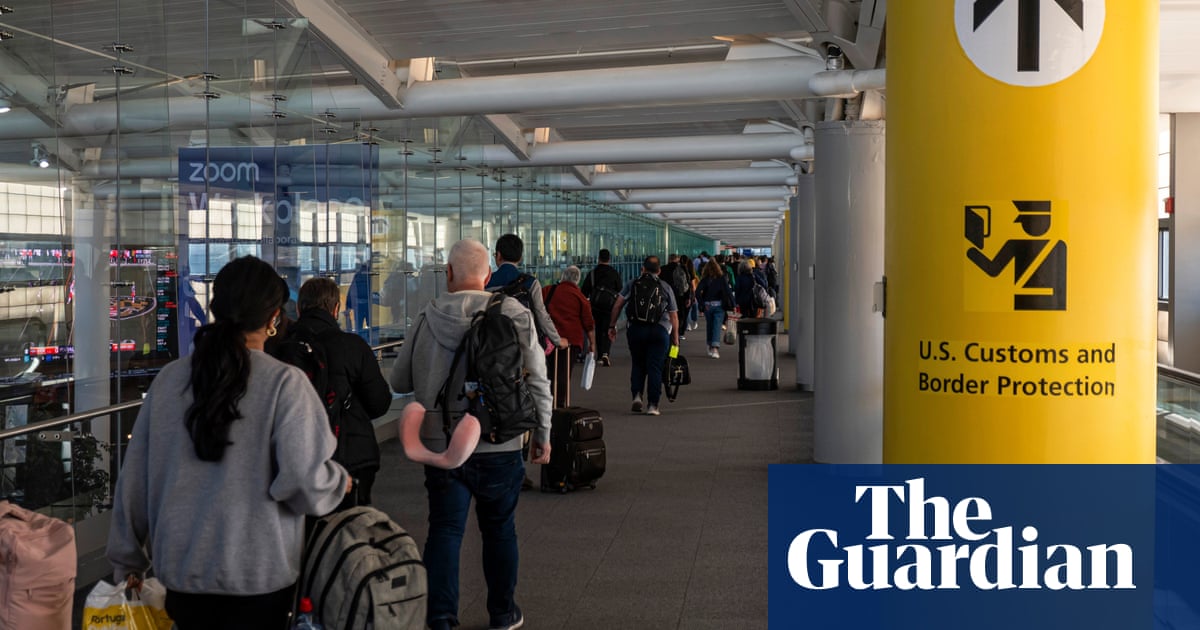Alan Thorpe runs his fingers over the braille note attached to the latest repair job to arrive at his doorstep in Sheffield. Reading from the tactile note, he says: “The paper won’t wind in and the keys are jammed. Good luck.”
Thorpe, 60, is the only certified repairer in the UK of Perkins braille typewriters, the world’s most widely used braille machines. Despite advances in digital technology, these 6kg analogue machines are still a vital communication tool for blind users and are especially crucial for teaching blind children to read and write.
But they need to work, so Thorpe’s talk of retirement has prompted alarm among his customers, including schools and local authorities.
“We’d be completely stuck without Alan,” says Rachel Ward, of North East Wales Sensory Support Service. She has driven from Flintshire to pick up 10 Perkins braillers that Thorpe has refurbished. She has also delivered two more machines with braille notes attached explaining what needs fixing.
Mending the intricate machines looks a daunting task. Inside is a complex mechanism of levers, springs, rollers and chains. But Thorpe, who has been registered as blind since the age of 15, does all the repair work by feel alone. And he is not fazed by the latest broken machines. He is sure they can be working again after a paraffin bath to clean up accumulated gunge and some careful plier work to straighten bent keys.

He takes them to his workshop in a converted bedroom of the house he shares with his wife, Sandra, who is also blind, and their guide dogs Velvet and Darcy. The room is stacked to the ceiling with boxes, tools and dozens of discarded Perkins braillers that are scavenged for parts.
The machines were first designed in 1951 at Perkins School for the Blind in Boston, Massachusetts, where they have been made ever since.
Thorpe tries to avoid the expense of importing parts from America. He says: “Local authorities and schools are my largest customers, so I try to keep the costs down as much as I can – and I’m a Yorkshireman.”
Asked if the machines are designed to be repaired by blind people, he says: “Absolutely not.” Pointing to the insides, he says: “There are six stylus pins, one for each dot, and inside each there are tiny little springs smaller than a grain of rice.”
He admits he struggles to replace these miniature springs without sighted help. It’s another reason to recycle parts. “It’s far more effective for me to take the machine apart and replace the stylus from a donated machine which I know is working,” he says.
If there is no alternative, he calls on his friend Andy to help with the sub-rice-sized springs. “He’ll do the odd thing and curses me for them,” Thorpe jokes.
For one day a week Thorpe also has assistance from Amanda, who is paid for by an access to work grant available to disabled people. She handles all the administration and occasionally helps to superglue rubber feet to the bottom of the machines, to save Thorpe getting glue on his fingers.
Thorpe is often amused by the objects he finds in the machines. “I’ve found pens, memory sticks, house keys, Lego bricks, little rubber toys, all sorts inside,” he says.
He is less amused when machines have been damaged after being used as makeshift steps or doorstops. “That’s bad,” he says. It offends his reverence for the machines, which he insists are “far from obsolete”.
He says: “I’ve got a machine here which is nigh on 70 years old and it’s still working. They’re going to be around for a while. We still teach sighted kids to use pencils to learn to write, so having a mechanical way of writing is still very important for blind kids.”

Thorpe is hoping to recruit an apprentice to take on his business. If he cannot find someone suitable, he suggests that the Royal National Institute of Blind People, which is celebrating 200 years since Louis Braille invented the embossed type, could help to provide a repair service.
Another of Thorpe’s customers, from a school for visually impaired (VI) pupils with more than 100 Perkins machines, is alarmed. The customer, who asked not to be named, said: “When he retires there will potentially be no one in the UK capable of the type of repairs Alan undertakes. The only other place would be the Perkins company in Boston, USA. The service he provides will be a huge loss to the VI community when he does eventually retire.”
Alan’s wife, Sandra, reckons he will carry on for while longer yet because he enjoys it so much. But she adds: “It’s a full-time job and it’s increased a bit lately. He needs someone to take it on, because he won’t be around for ever.”

.png) 3 months ago
38
3 months ago
38













































